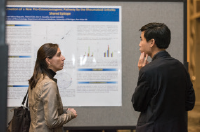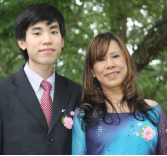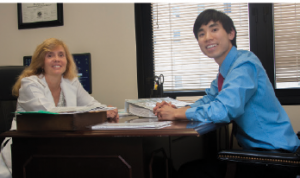
Dr. Le attended the ACR’s Rheumatology Research Workshop, which is held in conjunction with the Foundation’s Investigators’ Meeting. He used the opportunity to network with others in the field, such as Sarah Veloso Nogueira, PhD.
Brian Le, MD, a rheumatology fellow at the Medical College of Georgia at Augusta University (MCG), credits an excellent mentor and two Rheumatology Research Foundation preceptorships with guiding his career toward rheumatology.
“Working with Dr. Laura Carbone has opened up a lot of doors for me,” says Dr. Le. “I wouldn’t have such a great relationship with her if it weren’t for the Foundation preceptorships.”
Dr. Le was first introduced to the Foundation in 2014, when Laura Carbone, MD, MS, rheumatology division chief at MCG, urged him to apply for the Foundation’s Medical and Graduate Student Clinical Preceptorship, an award that supports a mentored, full-time clinical experience for students. Dr. Le received the award and spent one month working closely with Dr. Carbone and a handful of other faculty members and fellows to learn more about all the different aspects within the field. He was involved in adult rheumatology clinics, a pediatric rheumatology clinic, an osteoporosis clinic, a research project involving spinal cord injuries and a short course on biostatistics and epidemiology. He says the experience convinced him to choose rheumatology.
“I had the ability to pursue interests in research and writing, in addition to patient care. Truly, it is my passion to be able to make a difference in patients’ lives on a personal level, but also be able to create change or leave a legacy more globally.”

Dr. Le with his late mother, Hoa Le. He is carrying forth her legacy by pursuing a career in rheumatology to help patients.
Dr. Le’s career in rheumatology was then propelled again in 2015, when he received the Foundation’s Resident Research Preceptorship. This experience allowed him to do research with patients to study lupus and end-stage renal disease. “It gave me the opportunity to start my own project, ask a question, and go through the process. It has allowed me to develop a thinking method that is necessary to do research.”
Direction in a Difficult Time
The support for Dr. Le’s rheumatology career came at a much needed time. During his third year of medical school, Dr. Le’s mother was diagnosed with cancer. He says it was a difficult time caring for his family while trying to keep up with medical school. “I was ambivalent, overwhelmed and upset by the lack of direction in my career and my ambitions. I felt exhausted.”
He says that the preceptorship allowed him to regain his focus and enthusiasm for medicine. “For the first time in a long while, I was very hopeful and confident about the future. I feel as though the first preceptorship was a lifeline and a second chance. … Now, the future is exciting and full of possibilities.”
Dr. Le says that this excitement for his career helped him maintain hope through his mother’s illness and eventual passing. “My mother always taught me to help others, and rheumatology allows me to do just that. I feel like I found a higher purpose.”
Moving Forward

Dr. Le’s Foundation-funded preceptorships allowed him to work closely with his mentor, Dr. Carbone.
Dr. Le’s mentor, Dr. Carbone, also recognizes the progress in Dr. Le’s rheumatology career. “When Brian first started, I could see he was still undecided about his future,” she explains. “Since that time, he has decided to do rheumatology and we have accepted him into our rheumatology fellowship program at MCG. The awards he received from the Foundation enabled him to develop an interest and appreciation for this subspecialty. He will be a stellar rheumatologist.”
In appreciation for his own mentor, Dr. Le now hopes to encourage other young students and residents to choose rheumatology. “I’ve been telling other residents to apply for the preceptorships. By inspiring others to join the field, we can help patients.”
Dr. Carbone also continues to bring others into the field using Foundation preceptorships. Including Dr. Le, she has had a total of six trainees receive Foundation preceptorships. Three of those trainees worked on studies that have since been published. “We have found that many trainees are not aware of what a career in rheumatology can entail until they do this experience. It introduces them to many aspects of rheumatology, including both clinical and research experiences on a daily basis,” she explains. “They come away with a sense of excitement that they have found their home. They see how rewarding caring for these patients truly is.”
